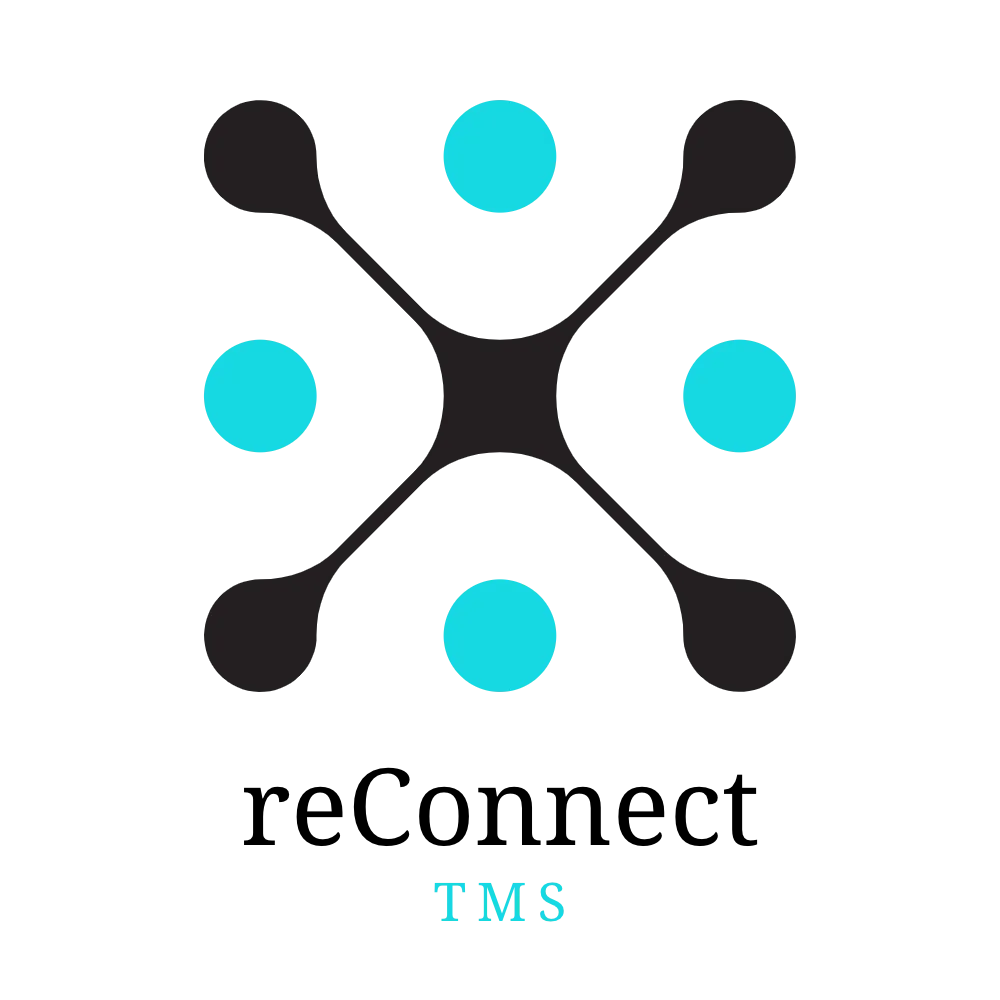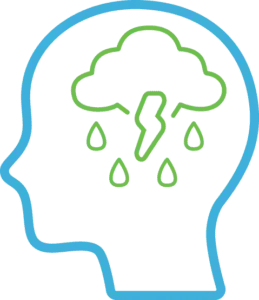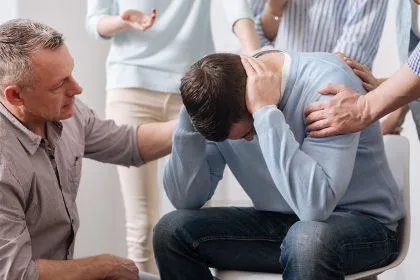Providing Australians with access to the world’s best mental health therapies
3 Albert Coates Ln, Melbourne VIC 3000, AU
Major Depressive Disorder
Providing Australians with access to the world’s best mental health therapies
Major Depressive Disorder
Depression, or major depressive disorder (MDD), is defined by the American Psychiatric Association
as a mood disorder characterized by a significant decrease in one’s quality of life across several different fields.
Emotionally, depression normally involves a great deal of sadness, loneliness, and a lack of hope or pleasure. It also brings about detrimental thoughts and actions that decrease the individual’s level of functioning.
Possible Causes for Depression:
Several risk factors have been found to increase the chance of developing MDD. These include genetics, temperamental inclination, childhood environment, significant life events and the existence of a medical condition or another psychiatric disorder.

Depression, or major depressive disorder (MDD), is defined by the American Psychiatric Association
as a mood disorder characterized by a significant decrease in one’s quality of life across several different fields.
Emotionally, depression normally involves a great deal of sadness, loneliness, and a lack of hope or pleasure. It also brings about detrimental thoughts and actions that decrease the individual’s level of functioning.
Possible Causes for Depression:
Several risk factors have been found to increase the chance of developing MDD. These include genetics, temperamental inclination, childhood environment, significant life events and the existence of a medical condition or another psychiatric disorder.

Treatment Options in Your Battle Against Depression
Thanks to major breakthroughs in research and fieldwork, a number of mental health treatments have been developed to safely and effectively treat MDD. Among them is Deep TMS, which was developed to address unmet needs that arose from legacy MDD treatments:
Medical Device Treatments: A number of cutting-edge medical technologies treat depression, with ECT, TMS, and Deep TMS gaining professional recognition.
ECT: Electroconvulsive therapy induces a brief set of seizures that stimulate the brain’s neural activity. Originally used to treat schizophrenia, ECT was eventually found to help alleviate severe depression, and today is primarily used to treat this condition. Though highly effective, ECT is not for everyone. It requires full sedation under anesthesia, which complicates the recovery process. Its side effects can be severe and include short-term memory loss. And due to a spread of misinformation surrounding this treatment, many patients are wary of trying it out.
Traditional rTMS: Available to the public since 2008, Transcranial Magnetic Stimulation is a noninvasive treatment for depression. The procedure sends out electromagnetic pulses from a figure-8-shaped handheld device, used to regulate the neural activity of brain structures found to be involved in depression. While rTMS has been clinically shown to be a safe and effective treatment option, this original, traditional form of TMS has certain limitations: The figure-8 coil’s relatively narrow scope means only a focal brain structure can be regulated at any given moment, causing targeting issues to arise during treatment. Standard rTMS also has trouble stimulating deeper structures directly, which can further affect its efficacy.
Deep TMS: Deep Transcranial Magnetic Stimulation is an advancement on the standard, figure-8 rTMS treatment that manages to address the concerns raised with its predecessor. Deep TMS is also a noninvasive treatment that utilizes a magnetic field to safely and effectively regulate the neural activity of brain structures associated with depression, in addition to other forms of mental illness. Deep TMS does not require anesthesia or recovery, and can therefore be incorporated into an individual’s daily routine.
Psychotherapy: Psychotherapy, or talk therapy, refers to speaking with a mental health professional to better understand one’s experiences and increase their wellbeing. Forms of psychotherapy commonly used to treat depression include psychodynamics, cognitive-behavioral therapy (CBT) and interpersonal therapy (IPT). Support groups for patients and their primary care providers have also been shown to offer relief.
Psychopharmacology: Several classes of medication have been shown to successfully treat depression. They include selective serotonin reuptake inhibitors (SSRIs), serotonin and norepinephrine reuptake inhibitors (SNRIs), and tricyclic antidepressants (TCAs). Though psychopharmacology is a generally effective MDD treatment, it can cause side effects such as weight gain or sexual dysfunction, and many patients are found to be treatment-resistant.
Lifestyle Changes to Protect Against MDD: While the above-mentioned factors are more stable fixtures, choosing to implement certain lifestyle changes can also help ward off depression. These include: adopting a Mediterranean diet rich with fruit, vegetables, olive oil and fish; participating in exercise to help release mood-elevating endorphins, strengthen self-worth and distract from depressive triggers; replenishing your energy levels through a good night’s sleep; and developing a balanced work-rest-play dynamic.
Treatment Options in Your Battle Against Depression
Thanks to major breakthroughs in research and fieldwork, a number of mental health treatments have been developed to safely and effectively treat MDD. Among them is Deep TMS, which was developed to address unmet needs that arose from legacy MDD treatments:
Medical Device Treatments: A number of cutting-edge medical technologies treat depression, with ECT, TMS, and Deep TMS gaining professional recognition.
ECT: Electroconvulsive therapy induces a brief set of seizures that stimulate the brain’s neural activity. Originally used to treat schizophrenia, ECT was eventually found to help alleviate severe depression, and today is primarily used to treat this condition. Though highly effective, ECT is not for everyone. It requires full sedation under anesthesia, which complicates the recovery process. Its side effects can be severe and include short-term memory loss. And due to a spread of misinformation surrounding this treatment, many patients are wary of trying it out.
Traditional rTMS: Available to the public since 2008, Transcranial Magnetic Stimulation is a noninvasive treatment for depression. The procedure sends out electromagnetic pulses from a figure-8-shaped handheld device, used to regulate the neural activity of brain structures found to be involved in depression. While rTMS has been clinically shown to be a safe and effective treatment option, this original, traditional form of TMS has certain limitations: The figure-8 coil’s relatively narrow scope means only a focal brain structure can be regulated at any given moment, causing targeting issues to arise during treatment. Standard rTMS also has trouble stimulating deeper structures directly, which can further affect its efficacy.
Deep TMS: Deep Transcranial Magnetic Stimulation is an advancement on the standard, figure-8 rTMS treatment that manages to address the concerns raised with its predecessor. Deep TMS is also a noninvasive treatment that utilizes a magnetic field to safely and effectively regulate the neural activity of brain structures associated with depression, in addition to other forms of mental illness. Deep TMS does not require anesthesia or recovery, and can therefore be incorporated into an individual’s daily routine.
Psychotherapy: Psychotherapy, or talk therapy, refers to speaking with a mental health professional to better understand one’s experiences and increase their wellbeing. Forms of psychotherapy commonly used to treat depression include psychodynamics, cognitive-behavioral therapy (CBT) and interpersonal therapy (IPT). Support groups for patients and their primary care providers have also been shown to offer relief.
Psychopharmacology: Several classes of medication have been shown to successfully treat depression. They include selective serotonin reuptake inhibitors (SSRIs), serotonin and norepinephrine reuptake inhibitors (SNRIs), and tricyclic antidepressants (TCAs). Though psychopharmacology is a generally effective MDD treatment, it can cause side effects such as weight gain or sexual dysfunction, and many patients are found to be treatment-resistant.
Lifestyle Changes to Protect Against MDD: While the above-mentioned factors are more stable fixtures, choosing to implement certain lifestyle changes can also help ward off depression. These include: adopting a Mediterranean diet rich with fruit, vegetables, olive oil and fish; participating in exercise to help release mood-elevating endorphins, strengthen self-worth and distract from depressive triggers; replenishing your energy levels through a good night’s sleep; and developing a balanced work-rest-play dynamic.


More About Deep TMS Treatment for Depression
Deep TMS treatment for depression works by utilizing a magnetic field that manages to directly reach wider and deeper brain regions, regulating the neural activity of brain structures related to major depressive disorder – specifically the dorsolateral prefrontal cortex (DLPFC).
Repeated peer-reviewed studies have found Deep TMS to be a highly effective treatment that can facilitate a profound improvement in patients’ mental health, alleviating symptoms of depression and contributing to a significantly greater quality of life.
As a noninvasive procedure, Deep TMS is a well-tolerated treatment that does not cause any adverse or long-lasting side effects. It does not require a significant recovery period, and the 20-min treatment can easily be integrated into each patient’s day-to-day schedule.
More About Deep TMS Treatment for Depression
Deep TMS treatment for depression works by utilizing a magnetic field that manages to directly reach wider and deeper brain regions, regulating the neural activity of brain structures related to major depressive disorder – specifically the dorsolateral prefrontal cortex (DLPFC).
Repeated peer-reviewed studies have found Deep TMS to be a highly effective treatment that can facilitate a profound improvement in patients’ mental health, alleviating symptoms of depression and contributing to a significantly greater quality of life.
As a noninvasive procedure, Deep TMS is a well-tolerated treatment that does not cause any adverse or long-lasting side effects. It does not require a significant recovery period, and the 20-min treatment can easily be integrated into each patient’s day-to-day schedule.
TMS therapy is now covered by Medicare
If your depression hasn’t responded well to two or more anti-depressants, you will eligible for Medicare reimbursement.


Providing Australians with access to the world’s best mental health therapies.
HEADQUARTERS
3 Albert Coates Ln, Melbourne VIC 3000, Australia
© 2023 reConnect TMS. All Rights Reserved.
Lorem ipsum dolor sit amet, consectetuer adipiscing elit. Aenean commodo ligula eget dolor. Aenean massa. Cum sociis natoque penatibus et magnis dis parturient montes, nascetur ridiculus mus. Donec quam felis, ultricies nec, pellentesque eu, pretium quis, sem. Nulla consequat massa quis enim. Donec pede justo, fringilla vel, aliquet nec, vulputate eget, arcu. In enim justo, rhoncus ut, imperdiet a, venenatis vitae, justo. Nullam dictum felis eu pede mollis pretium. Integer tincidunt. Cras dapibus. Vivamus elementum semper nisi. Aenean vulputate eleifend tellus. Aenean leo ligula, porttitor eu, consequat vitae, eleifend ac, enim. Aliquam lorem ante, dapibus in, viverra quis, feugiat a, tellus.
Phasellus viverra nulla ut metus varius laoreet. Quisque rutrum. Aenean imperdiet. Etiam ultricies nisi vel augue. Curabitur ullamcorper ultricies nisi. Nam eget dui. Etiam rhoncus. Maecenas tempus, tellus eget condimentum rhoncus, sem quam semper libero, sit amet adipiscing sem neque sed ipsum. Nam quam nunc, blandit vel, luctus pulvinar, hendrerit id, lorem. Maecenas nec odio et ante tincidunt tempus. Donec vitae sapien ut libero venenatis faucibus. Nullam quis ante. Etiam sit amet orci eget eros faucibus tincidunt. Duis leo. Sed fringilla mauris sit amet nibh. Donec sodales sagittis magna. Sed consequat, leo eget bibendum sodales, augue velit cursus nunc, quis gravida magna mi a libero. Fusce vulputate eleifend sapien.
Vestibulum purus quam, scelerisque ut, mollis sed, nonummy id, metus. Nullam accumsan lorem in dui. Cras ultricies mi eu turpis hendrerit fringilla. Vestibulum ante ipsum primis in faucibus orci luctus et ultrices posuere cubilia Curae; In ac dui quis mi consectetuer lacinia. Nam pretium turpis et arcu. Duis arcu tortor, suscipit eget, imperdiet nec, imperdiet iaculis, ipsum. Sed aliquam ultrices mauris. Integer ante arcu, accumsan a, consectetuer eget, posuere ut, mauris. Praesent adipiscing. Phasellus ullamcorper ipsum rutrum nunc. Nunc nonummy metus. Vestibulum volutpat pretium libero. Cras id dui. Aenean ut eros et nisl sagittis vestibulum. Nullam nulla eros, ultricies sit amet, nonummy id, imperdiet feugiat, pede. Sed lectus. Donec mollis hendrerit risus. Phasellus nec sem in justo pellentesque facilisis.
For Adults
You can call our highly experienced clinical team if your child, teenager or family is going through difficulties.
ANXIETY
DEPRESSION
BIPOLAR DISORDER
ADHD
A – Z OF ISSUES
For Children
You can call our highly experienced clinical team if your child, teenager or family is going through difficulties.
ADHD
ASPERGERS AND AUTISM
DEPRESSION
ANXIETY DISORDERS
A-Z OF ISSUES
For Business
You can call our highly experienced clinical team if your child, teenager or family is going through difficulties.
MEDICO LEGAL REPORTS
OCCUPATIONAL HEALTH
LOCUMS AND STAFFING
NEUROPSYCHOLOGICAL ASSESSMENTS
MENTAL CAPACITY ASSESSMETNS

WHO WE ARE
We Are The Best Support for You
Our clinic largest private mental health partnership, with a carefully selected nationwide team of Psychiatrists, Psychologists and Psychotherapists. We only work with highly experienced and capable partners who share our values.
WHAT WE OFFER FOR YOU
Therapies & Treatments
ONLINE SESSION
Get a Counselling Right Now
Our clinic largest private mental health partnership, with a carefully selected nationwide team of Psychiatrists, Psychologists and Psychotherapists. We only work with highly experienced and capable partners who share our values.

TMS therapy is now covered by Medicare
If your depression hasn’t responded well to two or more anti-depressants, you will eligible for Medicare reimbursement.

HEADQUARTERS
3 Albert Coates Ln, Melbourne VIC 3000, Australia
© 2023 reConnect TMS. All Rights Reserved.






